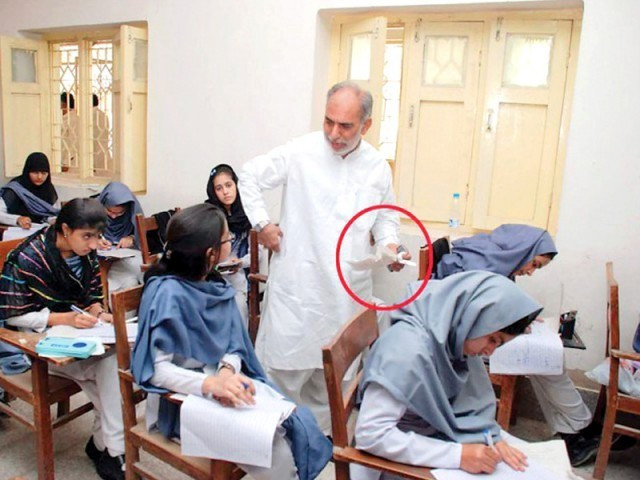“Is there a point to sitting examinations at all?”
The article was about the recent case in Sukkur where invigilators and school staff were found helping students cheat, as eager parents outside paid them off.
Let’s start by considering the question posed - is there a point to taking exams at all?
Across the globe, educational systems have implemented testing as a means by which to discriminate academic performance between students. However, this is a hangover of an educational system developed to provide cheap labour to the factories of the industrial revolution.
This system emphasises exam day performance; a cruel meritocracy that pushes students to value marks, grades and divisions. Students are conditioned to value outcomes rather than the process of learning.
That in part helps explain why examinations are important to students and indeed parents, who would go out of their way to facilitate their children in cheating in their exams. Perhaps the most heartening fact here is that at least parents are concerned about their children’s academic future!
Schools, especially administrators, love examinations. Student examination performance is taken to reflect teaching excellence. Sadly, teaching has been reduced to the lazy relationship that ‘good teachers produce good results’.
Now, cheating is not unique to poor government schools and colleges. In one form or the other, cheating takes place either at the individual level or even by institutional sanction. In the United States, several teachers lost their teaching licenses as they had erased and corrected their students SAT answer sheets. They indulged in this practice as they were incentivised by bonuses for raising class test scores.
In the United Kingdom, just last year, a hidden camera found examiners sharing 'tips' on upcoming exams with teachers. Teachers unions argued that the emphasis on viewing student grades as a proxy to rate teachers has led to a culture that encourages taking shortcuts which are not in the spirit of good teaching.
A further problem in Pakistan is the degree of inequality, particularly when it comes to opportunities available to students. Those from less affluent backgrounds do not enjoy the same level of support as their more affluent peers. They are at a disadvantage because they attend a state school where perhaps the teachers are under resourced, the infrastructure dilapidated and teaching methodology antiquated.
They cannot compete with students who receive private tuitions in the afternoon and parental contacts that provide a ready network for both academic and professional progress. Not to mention access to a more financially secure environment at home, private schooling and avenues for learning through play. Cheating, as reported in the Pakistani media which more often than not focuses on state schools, illuminates the case of students and parents trying to defy the odds, which are heavily stacked against them.
Now this is not to suggest that poverty explains cheating, or that poor students looking for shortcuts do not exist. I do not intend to offer excuses for some student’s behaviour. What I am trying to show is that cheating is not just a problem of poor discipline as some assume.
Cheating is a ubiquitous practice; it happens across economic and social classes and international boundaries, however, in Pakistan the incentives to indulge in such behaviour can become overwhelming.
Teachers and invigilators, disgruntled with poor administrators and wages may resign themselves to helping students for financial gain.
Parents, who have invested a lot of financial resources into their children’s studies, may feel that the outcome of one exam is too important to be left to solid hard work. A few hundred or a thousand rupees here and there is perhaps a small price to pay to ensure a desirable outcome.
A system of education that emphasises rote learning and the reproduction of facts makes cheating far too appealing. It’s hardly surprising given the backwardness of our public examinations. Now that open book exams have become quite common in universities, perhaps it’s not the production of answers through questionable means that’s the problem, but perhaps the manner in which the question are set?
It’s quite lazy to blame the students, the parents, the teachers or the blame of all blames, corruption. Cheating can only be reduced if students feel that their examination performance is an accurate reflection of their abilities relative to their peers.
As long as extreme inequality of opportunity exists, students, parents, teachers and administrators will always have an incentive to facilitate cheating at worst, or look the other way at best.
Read more by Nadir here or follow him on Twitter @needroos



COMMENTS
Comments are moderated and generally will be posted if they are on-topic and not abusive.
For more information, please see our Comments FAQ